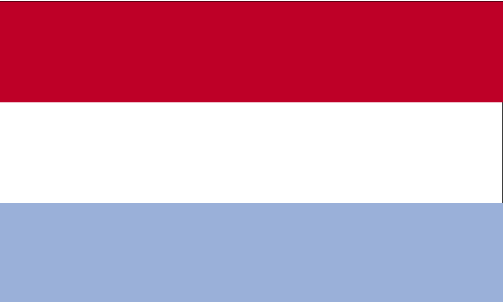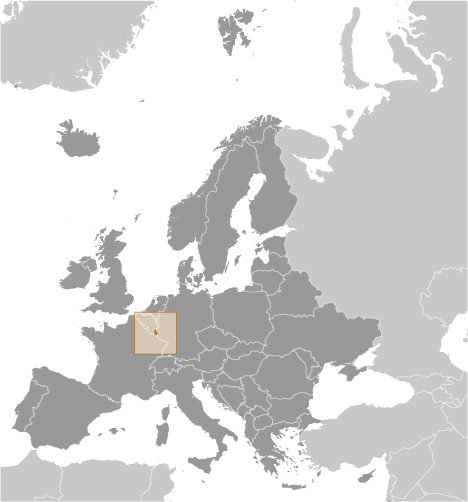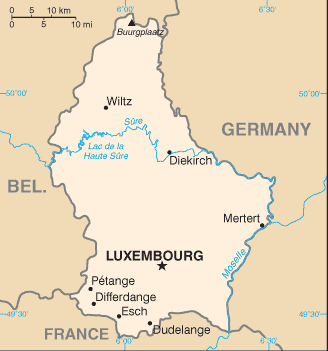Founded in 963, Luxembourg became a grand duchy in 1815 and an independent state under the Netherlands. It lost more than half of its territory to Belgium in 1839 but gained a larger measure of autonomy. Full independence was attained in 1867. Overrun by Germany in both world wars, it ended its neutrality in 1948 when it entered into the Benelux Customs Union and when it joined NATO the following year. In 1957, Luxembourg became one of the six founding countries of the European Economic Community (later the European Union), and in 1999 it joined the euro currency area.
Country Name
Conventional long form:Grand Duchy of Luxembourg
Conventional short form:Luxembourg
Local long form:Grand Duche de Luxembourg
Local short form:Luxembourg
Former:constitutional monarchy
Government Type
constitutional monarchy
Capital
Name:Luxembourg
Geographic coordinates:49 36 N, 6 07 E
Time difference:UTC+1 (6 hours ahead of Washington, DC during Standard Time)
daylight saving time: +1hr, begins last Sunday in March; ends last Sunday in October
Administrative divisions
3 districts; Diekirch, Grevenmacher, Luxembourg
Independence
1839 (from the Netherlands)
National Holiday
National Day (Birthday of Grand Duchess Charlotte) 23 June; note - the actual date of birth was 23 January 1896, but the festivities were shifted by five months to allow observance during a more favorable time of year
Constitution
17 October 1868; occasional revisions
Legal system
based on civil law system; accepts compulsory ICJ jurisdiction
Suffrage
18 years of age; universal and compulsory
Executive branch
Chief of state:Grand Duke HENRI (since 7 October 2000); Heir Apparent Prince GUILLAUME (son of the monarch, born 11 November 1981)
Head of government:Prime Minister Jean-Claude JUNCKER (since 20 January 1995); Deputy Prime Minister Jean ASSELBORN (since 31 July 2004)
Cabinet:Council of Ministers recommended by the prime minister and appointed by the monarch
(For more information visit the World Leaders website)
Elections:the monarchy is hereditary; following popular elections to the Chamber of Deputies, the leader of the majority party or the leader of the majority coalition usually appointed prime minister by the monarch; the deputy prime minister appointed by the monarch; they are responsible to the Chamber of Deputies
note: government coalition - CSV and LSAP
Legislative branch
unicameral Chamber of Deputies or Chambre des Deputes (60 seats; members elected by popular vote to serve five-year terms)
Elections:last held on 7 June 2009 (next to be held by June 2014)
Election results:percent of vote by party - CSV 38%, LSAP 21.6%, DP 15%, Green Party 11.7%, ADR 8.1%, The Left 3.3%, other 2.3%; seats by party - CSV 26, LSAP 13, DP 9, Green Party 7, ADR 4, The Left 1
note: there is also a Council of State that serves as an advisory body to the Chamber of Deputies; the Council of State has 21 members appointed by the Grand Duke on the advice of the prime minister
Judicial branch
judicial courts and tribunals (three Justices of the Peace, two district courts, and one Supreme Court of Appeals); administrative courts and tribunals (State Prosecutor's Office, administrative courts and tribunals, and the Constitutional Court); judges for all courts are appointed for life by the monarch
Political Parties and Leaders
Alternative Democratic Reform Party or ADR [Robert MEHLEN]; Christian Social People's Party or CSV [Michel WOLTER]; dei Lenk/la Gauche (the Left); Democratic Party or DP [Claude MEISCH]; Green Party [Francois BAUSCH]; Luxembourg Socialist Workers' Party or LSAP [Alex BODRY]; other minor parties
Political pressure groups and leaders
ABBL (bankers' association); ALEBA (financial sector trade union); Centrale Paysanne (federation of agricultural producers); CEP (professional sector chamber); CGFP (trade union representing civil service); Chambre de Commerce (Chamber of Commerce); Chambre des Metiers (Chamber of Artisans); FEDIL (federation of industrialists); Greenpeace (environment protection); LCGP (center-right trade union); Mouvement Ecologique (protection of ecology); OGBL (center-left trade union)
International organization participation
ADB (nonregional member), Australia Group, Benelux, CE, EAPC, EBRD, EIB, EMU, ESA, EU, FAO, FATF, IAEA, IBRD, ICAO, ICC, ICCt, ICRM, IDA, IEA, IFAD, IFC, IFRCS, ILO, IMF, IMO, Interpol, IOC, IOM, IPU, ISO, ITSO, ITU, ITUC, MIGA, NATO, NEA, NSG, OAS (observer), OECD, OIF, OPCW, OSCE, PCA, Schengen Convention, UN, UNCTAD, UNESCO, UNHCR, UNIDO, UNIFIL, UNRWA, UPU, WCO, WFTU, WHO, WIPO, WMO, WTO, ZC
Diplomatic representation in the US
Chief of mission:Ambassador Jean-Paul SENNINGER
Chancery:2200 Massachusetts Avenue NW, Washington, DC 20008
Telephone:[1] (202) 265-4171 through 72
FAX:[1] (202) 328-8270
Consulate(s) general:New York, San Francisco
Diplomatic representation from the US
Chief of mission: Ambassador Cynthia STROUM
Embassy:22 Boulevard Emmanuel Servais, L-2535 Luxembourg City
Mailing address:American Embassy Luxembourg, Unit 1410, APO AE 09126-1410 (official mail); American Embassy Luxembourg, PSC 9, Box 9500, APO AE 09123 (personal mail)
Telephone:[352] 46 01 23
FAX:[352] 46 14 01
Flag description
three equal horizontal bands of red (top), white, and light blue; similar to the flag of the Netherlands, which uses a darker blue and is shorter; the coloring is derived from the Grand Duke's coat of arms (a red lion on a white and blue striped field)










